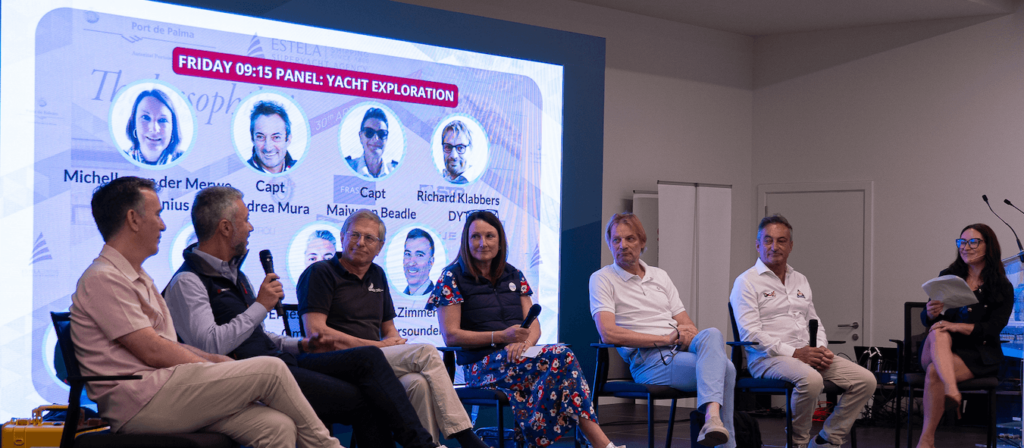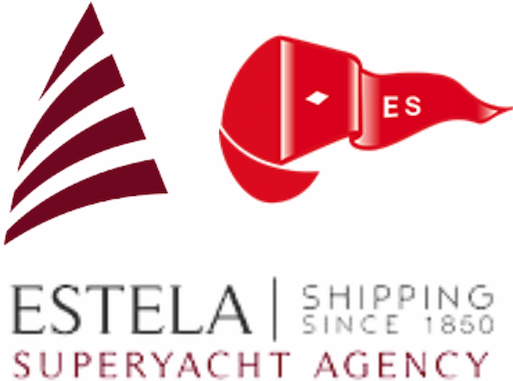Leading industry experts gathered at Palma’s Port Centre in May to discuss the evolving landscape of yacht exploration, from Arctic ice fields to technological frontiers

Moderated by Lucie Gardiner from Yachting International Radio, the panel brought together six leading industry experts to examine every facet of modern yacht exploration. From the ice-breaking waters of the Arctic to the technological challenges of maintaining connectivity in remote corners of the globe, the discussion revealed both the extraordinary opportunities and complex challenges facing today’s expedition yacht sector.
Listen to the panel session here: https://www.podbean.com/eas/pb-xt4tv-18f0333
Beyond the comfort zone
“It’s about doing something you were not expecting to do ever,” explained Richard Klabbers, founder and managing director of DYT Transport, when asked to define yacht exploration. His sentiment captured the spirit that’s driving owners away from predictable itineraries towards the unknown.
The panel’s diverse expertise painted a comprehensive picture of what modern yacht exploration truly entails. Captain Andrea Mura, the legendary Italian ocean racer with over fifty years at sea, brought the competitor’s perspective: “For me, it’s amazing passion for the sea in general… I was born for competition.”
Matt Zimmerman, CEO of FarSounder, offered a compelling reminder that exploration needn’t always mean the ends of the earth. “You don’t need to go to the North Pole,” he noted. “In the yachting community, as soon as you get outside the main shipping channels, you don’t know what’s there.”
The connected explorer
Perhaps no aspect of modern expedition yachting has evolved as dramatically as communications technology. Ernesto Esposito from OmniAccess outlined what he termed the “three S paradigm” governing remote connectivity: Solid connection, Safety, and Security.
“These days, when you have a unique experience, the first thing you want to do is share it with others,” Esposito observed. “There’s no experience without sharing these days.” But beyond social media posts and family updates, reliable connectivity has become a safety imperative.
The game-changer, according to the panel, has been Starlink. “It’s finally enabled proper Internet on board,” Esposito explained. “Now everyone on board is doing the same things you do at home or in your office.” However, this connectivity revolution brings its own challenges, particularly around cybersecurity—a concern that’s become increasingly relevant as exploration yachts venture into sensitive areas with valuable scientific data aboard.
Medical challenges in remote waters
Dr Spike Briggs, managing director of Medical Support Offshore, brought a sobering reality check to the discussion. His company handled over 1,600 medical incidents offshore last year; four times more than the UK Coast Guard. The statistics underscore the critical importance of proper medical planning for expedition voyages.
“Proper preparation prevents pathetically poor performance,” Dr Briggs noted, borrowing from medical wisdom. The approach requires assessing who’s on board, their medical histories, the vessel’s capabilities, and crucially, planning exit routes from remote locations.
The transformation in medical support has been remarkable. “When I was down in the Southern Ocean, it was SSB radio through Portishead, fairly patchy occasionally,” Dr Briggs recalled. “Now we get calls from the middle of the Pacific, and they sound like they’re in the office next door.”
The key advancement isn’t just clearer communication—it’s the ability to transmit objective medical data. “Having vital signs data and objective information from offshore improves our diagnostic ability, prognosis, and planning,” he explained.
Insurance: Planning for the unexpected
Michelle van der Merwe from Pantaenius revealed the complex insurance considerations that expedition itineraries demand. When clients approach them with plans for Alaska or Greenland, the first request is for detailed itineraries, crew CVs, and evidence of appropriate experience.
“We look at the yacht itself to see if we think it’s capable of doing these trips,” van der Merwe explained. This includes assessing ice class ratings for polar voyages, ensuring appropriate crew training and securing additional permits that many destinations require.
The insurance perspective highlighted a crucial point; expedition yachting isn’t simply about having an adventurous spirit and pointing the bow towards distant horizons. It requires systematic planning, appropriate equipment, and an experienced crew.
The science of exploration
One of the most compelling aspects of the discussion centred on how modern exploration yachts can contribute to scientific understanding. Matt Zimmerman shared a striking statistic: “while we’ve mapped 99% of Mars at six-metre resolution, only 26% of our ocean floor has been charted—and that’s at 100-metre resolution.”
“The vast majority of the ocean has never been mapped,” Zimmerman noted. “Places like Captain Cook’s voyages are still official data on US charts in some places.” Every yacht can contribute to Seabed 2030, an initiative to map the entire seafloor by sharing GPS and echo sounder data.
The citizen-science opportunities extend beyond bathymetry. Simple actions like photographing whale flukes (which are unique like fingerprints) and uploading them to databases like HappyWhale.com contribute to marine mammal research. These small acts of data collection transform tourists into witnesses, and expedition guests into active participants in scientific discovery.
Environmental stewardship
The panel didn’t shy away from addressing the environmental implications of expedition yachting. Richard Klabbers shared his experience from competitive sailing: “We kept everything on board for the whole journey. We didn’t throw anything away, not even ecological waste.”
This principle of leaving no trace has become fundamental to responsible expedition yachting. As Klabbers noted, “It needs to be part of your planning. What do you do with your waste? It’s easy to just throw it overboard—nobody can see it—but it’s just not who we are.”
Matt Zimmerman highlighted the whale conservation angle, sharing a fascinating ecological fact: “50% of the oxygen we breathe comes from phytoplankton, and their nutrients come from whale poop.” This interconnected web means that avoiding whale strikes isn’t just about protecting charismatic megafauna, it’s about protecting the very air we breathe.
Technology meets tradition
The discussion revealed how cutting-edge technology is enabling safer, more responsible exploration. Forward-looking sonar systems help prevent groundings and whale strikes. Satellite communications enable real-time medical consultations. Advanced weather routing helps navigate around storms.
Yet the human element remains paramount. Andrea Mura’s experience in competitive sailing highlighted the importance of crew dynamics: “When all the crew work together like one person, it’s amazing, and that’s when results arrive.”
Dr Briggs emphasised that while technology has transformed medical support capabilities, training remains crucial. “The emphasis has changed from being knowledge-based to skills-based,” he explained. “We can tell people what to do, but they have to do it themselves.”
Looking forward
As the panel discussion drew to a close, what emerged was a picture of an industry in transition. Expedition yachting is evolving from the domain of hardy adventurers with basic equipment to a sophisticated sector that combines cutting-edge technology with environmental responsibility and scientific contribution.
The message was clear: modern yacht exploration isn’t about escaping civilisation; it’s about engaging with it more meaningfully. Whether mapping uncharted seafloor, contributing to marine mammal research, or simply demonstrating responsible practices in pristine environments, today’s expedition yachts can be forces for positive change.
As Michelle van der Merwe noted, the industry is “in quite a good position to promote associations that are helping with saving the planet and the ocean.” The question isn’t whether superyachts should be exploring remote destinations, but how they can do so most responsibly and beneficially.
The ESTELA initiative
This inaugural panel discussion is representative of ESTELA’s commitment to the exchange of ideas and information, designed to foster best practices in an evolving industry.
Owners are becoming increasingly demanding in their pursuit of meaningful experiences beyond traditional cruising grounds. As such, bringing together experts from across the yacht exploration ecosystem — from navigation technology and medical support to insurance and environmental stewardship — isn’t just desirable; it is essential.
The success of this first breakfast seminar, held with support from the Port Authority of the Balearic Islands, suggests that the appetite for substantive discussions matches the appetite for adventure itself.
ESTELA extends its gratitude to all participating panellists and sponsors who made this inaugural breakfast seminar possible. We look forward to continuing these important industry conversations as the expedition yacht sector continues to evolve. To join the conversation, contact exploration@estelayachting.net
